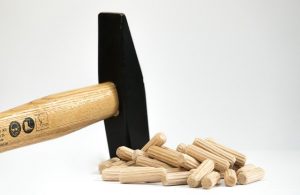
Consisting of straight and narrow solid rods, dowel pins are used in a plethora of manufacturing applications. They offer a simple and effective way to join two workpieces together. One end of the dowel pin is inserted into one of the workpieces, whereas the opposite end is inserted into the other workpiece. While all dowel pins are used to join workpieces, though, they are often made of different materials.
Wood
One of the most common materials in which dowel pins are made is wood. Wooden dowel pins, as shown in the adjacent photo, are cylindrical pieces of solid wood. They are usually made of hardwood varieties, such as beech or oak, that are denser and stronger than their softwood counterparts.
Wooden dowel pins are used in carpentry and woodworking applications. Chairs, benches, stools, recliners, sofas and other wooden furniture often feature multiple wooden dowel pins. They effectively join the furniture’s multiple parts without scratching or damaging it.
Metal
In addition to wood, many dowel pins are made of metal. Most metal dowel pins are made of steel. With that said, they aren’t all made of the same type of steel. Some dowel pins are made of high-carbon steel, while others are made of stainless steel or even zinc-plated steel. Stainless steel dowel pins and zinc-plated steel dowel pins offer better protection against corrosion, making them popular choices.
Metal dowel pins typically aren’t used in carpentry or woodworking applications. Instead, they are used in machinery and other metalworking applications. If a metal machine or workpiece contains multiple parts, a metal dowel pin may be used to join them. Metal dowel pins work well in machinery applications because they offer tight tolerances to provide a secure fit. They can be manufactured to fit precisely into the precut holes of a metal machine or workpiece.
Plastic
There are also plastic dowel pins available. Plastics, of course, encompasses a variety of synthetic and partially synthetic compounds. These compounds are processed and molded into plastic pieces, including dowel pins. Plastic dowel pins are lightweight, and they are resistant to rot and corrosion.
Plastic dowel pins are often used in some of the same applications as wooden dowel pins. However, they are particularly effective for applications where electricity or moisture are present. Plastic is a nonconductive material, so plastic dowel pins won’t interfere with electrical objects. And when exposed to moisture, plastic dowel pins won’t succumb to rot.
